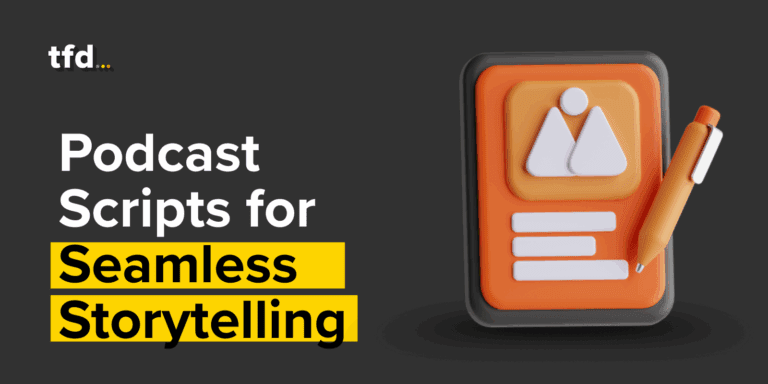A well-structured podcast script is your silent co-host and more than just a set of rules. You may stay focused, engage listeners, and reduce awkward pauses by using podcast scripts, regardless of your level of experience or desire to improve your flow. From cold opens to outros, having a basic plan boosts confidence and keeps your delivery consistent.
At TFD Podcast, scripting isn’t about sounding robotic—it’s about making every moment count.
Why Podcasting Script Matters?
Each episode’s tone, structure, and timing are established by a well-written podcast script. It guarantees that you don’t stray from the subject, forget transitions, or overlook important details.
Great podcasts may sound spontaneous, but they often follow a clear outline.
When you know your beats, you sound more professional. Plus, if you have sponsors or a call-to-action, a script guarantees nothing gets left out.

Podcast Script Writing Tips for Better Episodes
To make your podcast script sound fantastic, you don’t have to write down every single word. Actually, your delivery may come across as rigid if you try to write every sentence. Rather, think of your script as a useful manual that will help you stay on course and outline the important parts.
Here’s how to organize it simply:
- Start with a Hook: Immediately capture interest with an intriguing query or audacious claim.
- Introduction: Introduce yourself briefly and inform the audience of the topic of the episode.
- Main content: To maintain focus while sounding natural, employ spoken prompts or brief bullet points.
- Call to Action: Encourage readers to follow you, write a review, or click on your most recent link.
- Outro: Conclude with a recurring statement.
Flow, not perfection, is the aim. Although having a strong framework is beneficial, your true strength is in your ability to talk with confidence and ease.
Best Podcast Script Format to Follow
There’s no one-size-fits-all, but a good podcast script format often includes:
- Episode Title
- Objective
- Segments (Guest intro, Discussion, Break, Wrap-up)
- Time markers (to keep things paced)
- Notes or transitions
For TFD Podcasts, the format helps with editing and delivery—especially when interviewing founders or breaking down complex ideas. Clarity equals impact.
Discover 15 podcast formats to shape your show’s success.
Keeping Podcast Scripts Natural and Conversational
Your script is a guide, not a teleprompter. Read through it a few times before recording. Mark areas where you want to pause, emphasize, or improvise.
Great podcast scripts don’t feel scripted. They feel like confident, clear conversations. Think of your script as scaffolding—it supports the structure, but the real charm is in your personality.
When to Script and When to Freestyle
Interviews often require loose scripting—just the intro, bio, and key questions. Solo episodes or educational content benefit from tighter outlines.
Don’t be afraid to switch it up. Some creators use detailed scripts; others just use a headline and talk freely. The key is preparation. Know your points—even if you don’t write every word.
Conclusion

